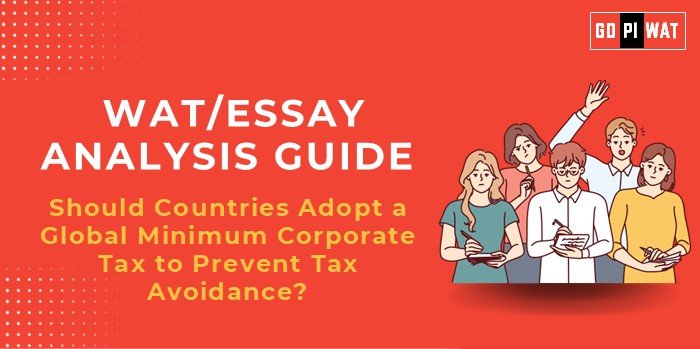📋 Written Ability Test (WAT)/Essay Analysis Guide
Should Countries Adopt a Global Minimum Corporate Tax to Prevent Tax Avoidance?
🌐 Understanding the Topic’s Importance
Corporate tax policies directly impact national revenues and global economic equity. A global minimum tax ties into themes of international cooperation, economic development, and ethical corporate governance.
🕒 Effective Planning and Writing
- Time Allocation:
- Planning: 5 minutes
- Writing: 20 minutes
- Review: 5 minutes
- Preparation Tips: Gather data on tax avoidance impacts, stakeholders, and global initiatives like BEPS.
✍️ Introduction Techniques for Essays
- Contrast Approach: “While nations vie for corporate investment by lowering tax rates, they collectively lose $240 billion annually due to tax avoidance—a paradox that underscores the need for global tax reforms.”
- Timeline Approach: “From early tax haven disputes to the 2021 OECD proposal, the concept of a global minimum tax reflects decades of struggle for equitable taxation.”
📚 Structuring the Essay Body
- Achievements:
- Highlight reduced tax competition and improved fairness in global markets.
- Use OECD and IMF data to substantiate success.
- Challenges:
- Mention enforcement issues and resistance from key economies.
- Provide examples of Ireland and Hungary’s reservations.
- Future Outlook:
- Suggest broader inclusivity for developing countries.
- Advocate for continuous revisions based on economic dynamics.
📝 Concluding Effectively
- Balanced Perspective: “The global minimum tax initiative is a significant step toward curbing tax avoidance but requires adaptive implementation to address diverse economic realities.”
- Global Comparison: “While OECD members lead the charge, the tax’s global success depends on equitable representation and robust enforcement.”
🔑 Recommendations for Sustainable Progress
- Strengthen international enforcement mechanisms.
- Introduce differential rates for developing nations.
- Promote digital tax systems for better compliance.
🌍 Sample Short Essays
- Balanced Perspective: “A global minimum corporate tax aims to balance fairness and economic growth. While addressing tax avoidance, it must also cater to the unique needs of developing economies to achieve inclusivity.”
- Solution-Oriented: “To combat profit shifting effectively, a 15% global tax must be complemented by robust enforcement and tailored provisions for lower-income nations.”
- Global Comparison: “Global tax reforms like the OECD’s initiative highlight the need for international cooperation, mirroring successes seen in nations like Germany and challenges faced by tax havens like Ireland.”


